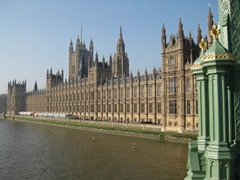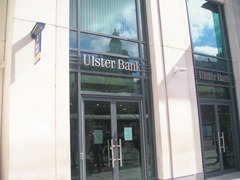Parliament turns spotlight on local banking
 MPs on the Northern Ireland Affairs Committee are focusing on how to improve banking in the province. agendaNi sums up the views put forward by constituents, business groups and banks.
MPs on the Northern Ireland Affairs Committee are focusing on how to improve banking in the province. agendaNi sums up the views put forward by constituents, business groups and banks.
The Northern Ireland Affairs Committee launched its inquiry into the banking structure in the province last July. Its terms of reference covered seven points:
1. the structure and governance of banks;
2. the possible break-up of RBS/Ulster Bank;
3. the position of the staff of the former Irish Bank Resolution Corporation;
4. access to finance, particularly for SMEs;
5. ineffectiveness of national initiatives to help aid economic recovery; and
6. access to banking in rural communities.
As financial services and markets are reserved to Westminster, the Assembly has little or no influence over policy in these areas. Running alongside this inquiry, the Treasury Select Committee is holding its own inquiries into EU financial regulation, the lending practices of banks and specifically lending to SMEs.
The deadline for written submissions was 2 September. The committee is not obliged to accept submissions as evidence. Oral evidence began on
11 September and the committee has heard from the four main banks (see next article) and witnesses representing their major local customers.
Evidence has also been given by Financial Secretary Sajid Javid, Finance Minister Simon Hamilton and two Northern Ireland Assembly committee chairmen: Daithí McKay (Finance and Personnel) and Patsy McGlone (Enterprise, Trade and Investment).
Questioning
In the first session, Consumer Council Director of Policy Aodhan O’Donnell explained that 13 per cent of Northern Ireland residents do not have a bank account, compared to 7 per cent across the UK as a whole.
 The council’s first priority was to “make sure that people are in the system” and also see more customers being confident enough to switch accounts – at present only 4 per cent have done that. O’Donnell added: “If people switched, compared products and changed products a bit more, there may be better innovations of products from the banks themselves.”
The council’s first priority was to “make sure that people are in the system” and also see more customers being confident enough to switch accounts – at present only 4 per cent have done that. O’Donnell added: “If people switched, compared products and changed products a bit more, there may be better innovations of products from the banks themselves.”
Sylvia Hermon pointed out that local customers were often loyal to a particular bank with that loyalty being passed down through families. “Very few” customers left Ulster Bank even after the 2012 IT crisis.
“For consumers to switch,” O’Donnell said, “it is often talked about as a double hurdle, in that you have to know that you can switch, first of all, and then you have to decide what you switch to. Focusing on those two areas is key.”
Customers would also prefer more decision-making at the branch level rather than being asked to call someone else in the bank. The Consumer Council has found that two or three branches have closed in some places because the banks look at closures individually rather than consulting with other banks. People who are reluctant to use online banking are therefore left isolated, whether in urban or rural areas.
Hermon noted that one constituent was told by letter than their local branch was closing despite banking there for several years. Another constituent, aged 87, had to go by bus from Donaghadee to Newtownards to get to her new bank.
Conservative MP Nigel Mills, though, said that Northern Ireland probably had more bank branches per head of population than the rest of the UK and local customers were therefore better served than his constituents in Derbyshire.
David Simpson saw a particular need to get more people into the banking system as universal credit was approaching. The new benefit will, by default, be paid through online accounts.
BBA views
The British Bankers’ Association (BBA) includes all retail banks operating in Northern Ireland. Its Chief Executive, Anthony Browne, was previously an economic adviser to Boris Johnson, Director of the Policy Exchange think tank and a journalist with The Times and BBC.
Browne told MPs: “I have not seen any evidence that there is a systematically different level of treatment of customers in Northern Ireland from the rest of the UK.”
Answering Alasdair McDonnell, he said: “The overwhelming reason why people have not applied for finance across the UK – and I am sure it is the same in Northern Ireland – is the lack of economic confidence in the future.”
Oliver Colvile, a Conservative MP, played devil’s advocate by claiming that lending figures are lower in Northern Ireland because of the private sector’s relatively small scale.
“It is an obvious point that the amount of borrowing there by businesses and by SMEs depends on the size of the SME sector in different parts of the country,” Browne replied. “There is absolutely no doubt about that.”
Naomi Long understood that small businesses do not approach banks for loans because it may mean having to accept worse terms and conditions or accelerated repayments. Browne commented: “I am not aware of it happening. That is not to say it does not happen, and I am happy to take it away and ask business groups about it.” Ian Paisley Junior affirmed that farmers encountered the same problem despite being an “important, steady and solid base” for lending.
Browne was wary of publishing postcode data on lending in Northern Ireland as this may give a competitive advantage to larger banks who are interested in operating in the market.
Then CBI Chairman Ian Coulter apologised for “going over old ground” by saying that banking was still “the single biggest blocker to growth in Northern Ireland.” The halving of house prices had “massive ripple effects in terms of all different types of borrowing and debt.” Northern Ireland’s banking situation was also akin to that in the Republic, because of the dominance of Irish banks.
The Federation of Small Businesses has 7,000 members in Northern Ireland. Its Head of External Affairs, Roger Pollen, said that the “lack of connection” with the main British banks meant that funding initiatives such as Project Merlin or Funding for Lending “really only trickle down into Northern Ireland at best.”
He also pointed out that a BBA press release had talked about publishing lending data by postcode “across the UK” but Northern Ireland was left out of the scheme: “This is despite our local banks suggesting that there is no significant barrier to them doing so.”
Glyn Roberts represented the Northern Ireland Independent Retail Trade Association, which has 1,400 members. Bank branches were important for bringing footfall into town centres and he welcomed Belfast Lord Mayor Máirtín Ó Muilleoir’s challenge to banks to come up with alternative uses for vacant branches.
Roberts also suggested a Northern Ireland banking forum (co-chaired by the Secretary of State and Finance Minister) which would also include members from the main banks and business organisations. He also wanted banks to inform MPs when a branch was to close; they had often first read about it in the local paper.
Kate Barker chairs the Economic Advisory Group which, in turn, reports to Enterprise Minister Arlene Foster. The group had published a detailed review of businesses’ access to finance in March 2013, which found that demand was limited by high property debts and a rising cost of finance.
She remarked: “There is perhaps a lack of understanding that the banks had to move from a situation where they lent a lot on property security towards a situation of lending much more on the business plan approach.” Banking was not the only source of finance but equity finance was often hard to draw down in Northern Ireland.
Assembly
“Sometimes I am glad I do not have any authority over the banks when I see the extent of the problems,” Simon Hamilton quipped at the start of his evidence. He was “heartened” to see Scandinavian banks operating in Britain for the first time and he hoped to see them in Northern Ireland as well.
“I am quite content with what NAMA has done to date,” Hamilton added. “They have been able to release some property on to the market, and they have been able to give some of the organisations and businesses that are tied up in NAMA some additional finance to put additional value into their assets so that they can sell them off for a higher price.”
He welcomed the decision to keep Ulster Bank as part of RBS Group and wanted to see it put “on to a long-term sustainable footing.” However, they would inevitably mean further job losses and branch closures.
Hamilton warned that postcode data could identify individual customers and therefore breach their confidentiality. That said, he saw no reason why this could not be done for larger areas such as local government districts or constituencies.
Patsy McGlone identified three main problems facing SMEs:
1. restricted lending affects their cash flow facility and their ability to pay wages;
2. start-ups find it hard to get loans as they do not have an established track record; and
3. delays in decision-making processes within banks.
Daithí McKay cited three more difficulties:
1. the reluctance of banks to provide sufficient lending data;
2. a general risk aversion within banks; and
3. the aggressive banking highlighted by the Tomlinson review.
McKay thought that a similar independent review would be useful to ascertain whether aggressive practices were being used here in Northern Ireland.
Individual businesses have been reluctant to appear before the inquiry, reportedly fearing that criticising the banks would have financial consequences. The inquiry’s evidence can be followed online at www.parliament.uk/niacom
Members’ interests
Ian Paisley Junior has regularly declared his role as an advisor to French bank EBI SA which involves “providing periodic advice for economic reports and analysis on global politics.” EBI SA is an affiliate of Ecobank which is based in the West African country of Togo.
He also has a 25 per cent shareholding as a director in QUBRIC Ltd, a private company which shares Northern Ireland’s experience of peace-building and conflict resolution. It was set up in 2012 and its founding directors also included Jeffrey Donaldson and DUP special adviser Emma Little.
Five other members have general business interests.
David Simpson is a director of the Universal Meat Company in Portadown. He owns and rents farmland at the company’s site and also outside Dungannon.
Alasdair McDonnell rents properties in Belfast, London and County Antrim and has shareholding in Arrow Travel (a Belfast-based travel agency). Oliver Colville is a shareholder in Polity Communications Ltd, a consultancy firm involved in regeneration projects. Stephen Hepburn and Nigel Mills are residential landlords in London and Nottingham respectively.






